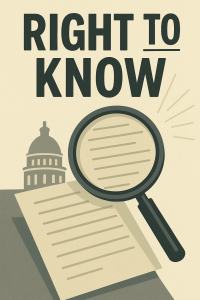 My article titled “Sealed Justice: Federal Courts’ Inconsistent Record-Sealing Rules and Their Impact on Judicial Transparency” recently came out in the Journal of Free Speech Law. In the article I argue that federal district courts are doing a poor job of protecting the public’s right of access to court records. Despite the longstanding presumption that court records are open for public inspection, parties frequently attempt to “seal” documents in order to hide them from public view. Empirical research reveals that the sealing of court records is extensive and increasing. This project is the first to comprehensively examine whether federal district courts provide clear and consistent local rules for sealing court records in civil and criminal cases. It also evaluates whether these local rules align with established Supreme Court and circuit court precedent concerning the public’s right of access to judicial records.
My article titled “Sealed Justice: Federal Courts’ Inconsistent Record-Sealing Rules and Their Impact on Judicial Transparency” recently came out in the Journal of Free Speech Law. In the article I argue that federal district courts are doing a poor job of protecting the public’s right of access to court records. Despite the longstanding presumption that court records are open for public inspection, parties frequently attempt to “seal” documents in order to hide them from public view. Empirical research reveals that the sealing of court records is extensive and increasing. This project is the first to comprehensively examine whether federal district courts provide clear and consistent local rules for sealing court records in civil and criminal cases. It also evaluates whether these local rules align with established Supreme Court and circuit court precedent concerning the public’s right of access to judicial records.
Here is the full abstract:
Public access to court records is a cornerstone of democratic governance, enabling public oversight of the judiciary and fostering confidence in the rule of law. Despite a strong presumption in favor of openness under both the First Amendment and common law, the sealing of federal court records has become widespread, often with minimal judicial scrutiny. Recent investigations have revealed that excessive court secrecy shields government and corporate misconduct, conceals vital public-safety information, and erodes public confidence in the courts.
This Article presents the first comprehensive analysis of the local rules governing sealing in all 94 federal districts, reviewing more than 700 provisions in both civil and criminal rules. The findings are concerning: Nearly half of all districts lack general sealing rules, many fail to reference the controlling legal standard, and basic procedural safeguards—such as public notice, consideration of alternatives to sealing, and case-specific identification of harms—are frequently absent. These deficiencies have created a patchwork of inconsistent, often toothless rules that enable secrecy to spread largely unchecked.
Without changes to federal rules, court-ordered secrecy will continue to erode public trust and obscure the work of the federal courts. This Article proposes three core principles to guide this reform. First, substantive clarity: Every rule governing sealing should expressly affirm the presumption of public access and incorporate, at a minimum, the common law’s requirements for sealing. Second, procedural rigor: Rules should require public notice of sealing requests, an opportunity for objections, identification of specific harms, consideration of less-restrictive alternatives, and mechanisms for periodic review and unsealing. Third, administrative efficiency: Rules should require parties to limit the frequency and narrow the scope of their sealing re-quests, explore redaction as an alternative, and certify their efforts to minimize the need for sealing.
You can download the article from SSRN or from the Journal of Free Speech Law.

 My recent article on
My recent article on 
